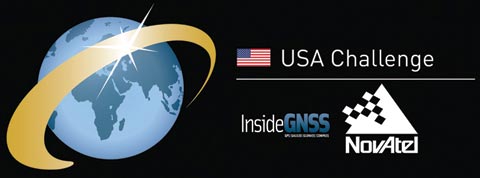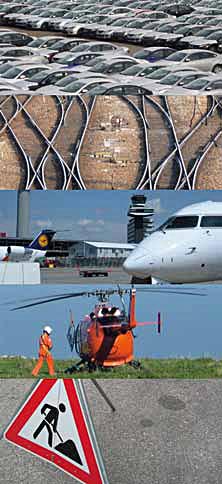

Judges all over the world are poring over 357 GNSS application innovations submitted to the 2010 European Satellite Navigation Competition (ESNC) from 44 countries in Europe, Asia Pacific, the Middle East and North America — a 23 percent increase for both registrations and full submissions compared to last year.
The deadline for submissions was July 31 for the seven-year-old contest known as the Galileo Masters Awards.
 Collage by the German Aerospace Center (DLR) for their 2010 ESNC special topic prize in "Next Generation Navigation."
Collage by the German Aerospace Center (DLR) for their 2010 ESNC special topic prize in "Next Generation Navigation."
The 2010 competition includes the USA Challenge, the first time North America has been included in the expanding competition. The Challenge received 24 completed applications, tying for fourth place with the state of Hessen, Germany. The United Kingdom and Ireland produced the most innovation ideas with 65, Taiwan was second with 46 followed by Bavaria, Germany, with 34 entries.
The USA Challenge was co-sponsored by NovAtel and Inside GNSS and supported by the University of Calgary Position Location And Navigation (PLAN) group. Inside GNSS also serves as global media sponsor of the ESNC. Six judges from Canada and the United States will select five finalists, who will be announced at the Inside GNSS Editorial Advisory Council lunch on Thursday, September 23, at the ION GNSS 2010 in Portland, Oregon.
The USA Challenge award winner will receive a $1,000 cash prize, be featured on the cover of the November-December 2010 issue of Inside GNSS magazine, and will also receive airfare and accommodations for a free two-day consultation with the experts of the PLAN group, a worldwide GNSS research and education center of excellence.
The feature story will reach 35,000 experts, industry, and policy leaders in the global GNSS community and will reach more GNSS specialists in a dedicated section of the Inside GNSS website.
The USA Challenge winner and top ESNC regional and special topic contest winners will celebrate on October 18 at der Residenz, a former royal palace in Munich, Germany. All of them are in the running for the 2010 Galileo Master’s grand prize of €20,000 (US$ 25,640) and other business development opportunities.
Past Galileo Masters Award winners include a real-time tour guide service for travelers, a satellite-based method for locating multiple avalanche victims quickly; an integrated system for remote prenatal monitoring; a mobile, location-based game that turns players into joysticks; and a system that combines satellite positioning with wind measurements and search-and-rescue dogs’ sense of smell.

